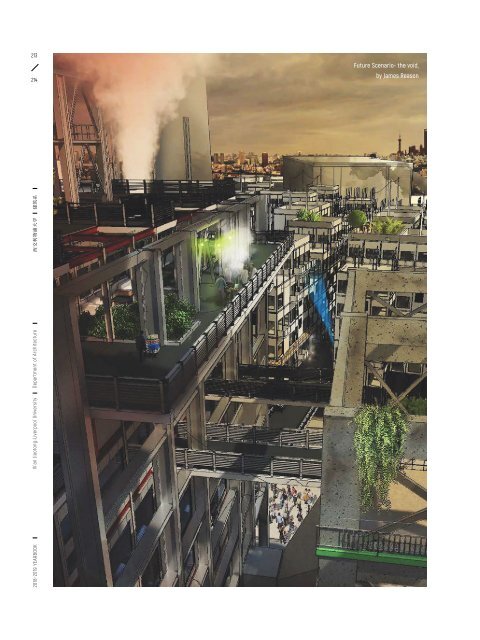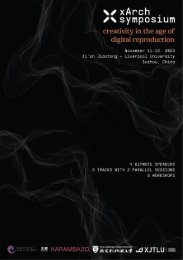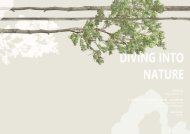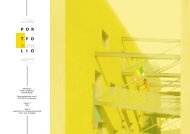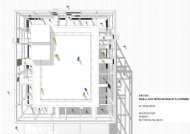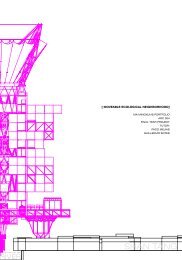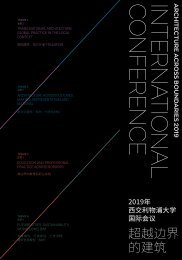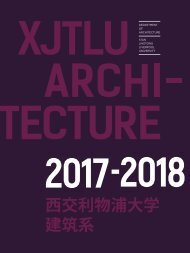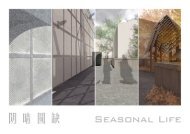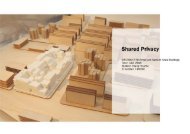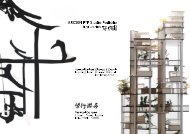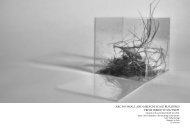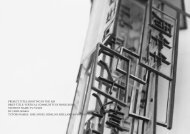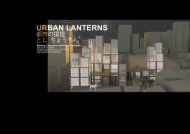YEARBOOK 2018 - 2019 | XJTLU DEPARTMENT OF ARCHITECTURE
The sixth edition of the yearbook of the Department of Architecture at Xi'an Jiaotong-Liverpool University presents student works created during the academic year 2018 - 2019. The yearbook exemplifies the new model for Chinese architectural education for which the department was commended by the Royal Institute of British Architects (RIBA). It is also a showcase of the creative culture that has guided our students towards successful international careers as responsible and creative architectural designers. The Department of Architecture at XJTLU offers RIBA Part 1, 2 and 3.
The sixth edition of the yearbook of the Department of Architecture at Xi'an Jiaotong-Liverpool University presents student works created during the academic year 2018 - 2019. The yearbook exemplifies the new model for Chinese architectural education for which the department was commended by the Royal Institute of British Architects (RIBA). It is also a showcase of the creative culture that has guided our students towards successful international careers as responsible and creative architectural designers. The Department of Architecture at XJTLU offers RIBA Part 1, 2 and 3.
Create successful ePaper yourself
Turn your PDF publications into a flip-book with our unique Google optimized e-Paper software.
213<br />
214<br />
Future Scenario- the void,<br />
by James Reason<br />
ARC405<br />
Design Studio 1<br />
Fluid City<br />
Shanghai’s waterfront reloaded<br />
<strong>2018</strong>-<strong>2019</strong> <strong>YEARBOOK</strong> Xi’an Jiaotong-Liverpool University Department of Architecture 西 交 利 物 浦 大 学 建 筑 系<br />
Level 4<br />
( Year 1 | Semester 1 )<br />
Module Credits<br />
10<br />
Module Leader<br />
Juan Carlos Dall’Asta<br />
Teaching Team<br />
David Vardy<br />
Thomas Wortmann<br />
TA Xiaohan Chen<br />
Guest Critics<br />
Wang Fang<br />
Ying Hu<br />
Weng Xueyan<br />
Number of Students<br />
14<br />
In this studio, students were asked to develop design proposals based in<br />
the transformation-regeneration of a dismissed industrial site located in<br />
Yangpu waterfront’s area, to pursue the re-activation.<br />
Waterfront renovation design strategies require deeper research<br />
and understanding that has to mitigate urban development with<br />
environmental requirements. Water into the urban context encourages<br />
innovation that led to improve and produce more creative management<br />
of water-related resources, water-resilient architectural design<br />
strategies and techniques, and the development of a proactive vision of<br />
urban landscape transformed and enhanced by water.<br />
The objective was, through the design proposal, to define strategies,<br />
scenarios, and tactics for the development of innovative incubators.<br />
Sustainable urban development practices allow through “urban<br />
creativity” the creation of innovative experimental clusters for the<br />
enhancement of the existing historical contexts.<br />
Students took into consideration the presence and value of the Industrial<br />
Architectural heritage in the site, as an opportunity of placemaking and<br />
qualitative transformation. A dialogue between memory (industrial<br />
heritage) and innovation (new spaces for makers) represented an<br />
exciting challenge for the successful re-activation of the waterfront.<br />
Level 04 – Year 1<br />
M Arch Des Programme


